
Haa is one of the country's smallest Dzongkhags, having an area of around 1706 square kilometers and located south of Paro. This little location, decorated with virgin alpine woods and quiet mountain peaks, is one of Bhutan's most attractive and remote areas. The Haa Valley, a steep north-south valley with a small floor, is the most prominent feature of Haa. Haa is a name that connotes arcane secrecy. The district is also known as "Hidden-Land Rice Valley." Rice, wheat, and barley are the principal commodities farmed here. Farmers also cultivate other income crops including potatoes, apples, and chilies on the valley floor, along terraced hillsides, and in some of the more accessible side valleys. The Torsa Strict Nature Reserve, one of Bhutan's environmentally protected regions, is located in this region.
Haa Valley is a famous tourist destination with several attractions in and around the valley. However, the following are some of the most popular destinations you will love to explore are:
One of the best places to visit in Haa Valley is Lhakhang Nagpo. Lhakhang Nagpo, also known as the Black Temple, was established in the 7th century by Songtsen Gampo, a Tibetan King. The temple is beautifully painted in black and is built on top of a lake in the middle of a serene green lush forest. It does, however, have deep horizontal red and white slots. It is one of the top spots to visit in Haa Valley because of its breathtaking views.
Lhakhang Karpo, also known as the White Temple, is a true representation of Bhutanese art and culture. The temple's walls are adorned with paintings and murals depicting famous Buddhist saints, deities, and gurus. Tourists can embrace authentic Buddhist qualities of love and Dharma at this temple. Furthermore, the annual festival Haa Tsechu is held here, providing travelers with an opportunity to learn about Bhutanese culture.
The white and black temples were both constructed about the same time. The black temple, unlike the white temple, lacks monk apartments. The only place to stay in the Lhakhang Nagpo is the caretaker's little cabin, where he lives with a vicious dog. The floor of the black temple has an opening that leads to the lake beneath it, where the mermaid spirit (tshomen) lives. Don't miss a visit to the Haa Valley's holy oak tree, which is located near the Lhakhang Nagpo.
Haa Wangchuklo Dzong, built in the year 1915, is a wonderful site nestled in the lush green alpine forest. This magnificent monastery is exquisitely painted. While going in and around this monastery, admire its presence and spend some quality time with it. This Dzong is unique in comparison to other Dzongs in Bhutan; most Dzongs in Bhutan were erected on a hillside or ridge top to protect the country from foreign expansion and invasion. The Dzong now serves as the headquarters of IMTRAT, as well as housing a military school, a military hospital, and a school for children of Indian army troops. A new dzong was built in 1968, and it now serves as the administrative center for the district.
Approximately 26 km driving distance away, Chele La Pass is another best place to visit near Haa Valley. Chele la Pass can be found on the road to Haa Valley. This is an excellent spot for a perfect view of Mount Chomolhari and Jichu Drakey, as it is located at an elevation of 3988 meters. You can also take a leisurely stroll across this hilly landscape while sipping a hot cup of tea.
Haa Valley is one of Bhutan's most beautiful areas, surrounded by lush green forests and beautiful buildings. It is undeniably a tourist's paradise, with several attractions and activities to engage in as a visitor. The following are some of the top things to do in Haa Valley.
Trek through Haa Valley's deep woodland to find some of the less used paths. While admiring the scenic magnificence of this breathtaking location, relax in the tranquil ambiance. It is known as the trekkers' heaven because of its picturesque perspective of the virgin Alpine forest and Majestic Mountain peaks.
Picturesque The Haa Chu River runs directly through the valley's heart. You'll enjoy walking along the riverbank, listening to the sound of water crashing against stones, and admiring the clouds embracing the mountains all around you. During sunrise and sunset, the views are even more breathtaking. A very stunning tiny hanging bridge may be found a short distance down from the taxi station. Simply stand in unison among the prayer flags, listening to the sound of running water and experiencing the beating cold wind.
Haa Valley is home to a variety of colorful Himalayan birds because of its lush green forest. Wander through this alpine forest and let you be enchanted by the beauty of the birds. The soothing chirping of these birds will definitely relax your mind and spirit. In short, this valley proves to be a paradise for birdwatchers.
Learn about the Bhutanese inhabitants of the surrounding villages and their traditional way of life. Recognize and respect their culture and traditions. Also, be astounded at the friendliness of these individuals. Knowing their culture has become one of the most significant things to accomplish in Haa Valley because of their kindness.
Chele La Pass is located halfway between Haa valley and Paro and is well worth a visit in every aspect. As you climb from Haa (elevation 2670 m) to Chele La (elevation 3810 m), the weather will change considerably, with stronger winds and clouds giving way to rain. In short, you will love the ride to Chele La Pass.
The best time to visit Haa Valley is from October to November. Autumn is when Mt. Jomolhari and its snow-covered surrounds are at their most beautiful. The weather is pleasant, making a hike in the valley ideal. You will have the time of your life here, and the variety of activities available in this area will not disappoint you. You're in for a slew of seasonal adventures.
April to June: The valley encompassing Haa Valley is covered with a blossoming vision of vivid flowers in the months of April to June. Visitors can enjoy the calm ambiance and good weather of Haa Valley in addition to the spectacular vista of blooming flowers.
July to September: Haa Valley witnesses just a little bit of rainfall at this time of year. Monsoon is also an excellent time to visit Haa Valley if people don't mind the slightly chilly temperatures and foggy weather.
October to March: Because the sky is clear at this time of year, Haa Valley presents a breathtaking panorama of snow-capped mountains. This is also the greatest time to visit Haa Valley if adventure activities like trekking and bird watching are your main priorities.
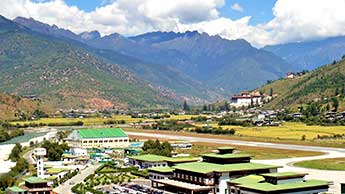
Paro is Bhutan's one of the most popular towns with many sacred sites and historical buildings.
View Details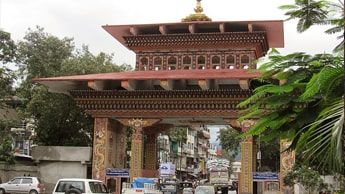
Phuentsholing is the border town in Bhutan with lots of popular places and attractions.
View Details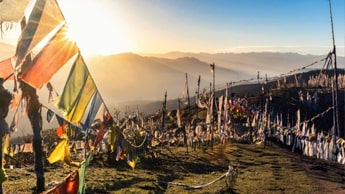
Chele La Pass is one of the highest motorable passes in Bhutan with breathtaking scenary of nature.
View Details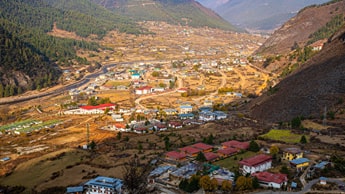
Haa Valley is tranquil yet popular north-south valley whose other name is Hidden Lande Rice Valley.
View Details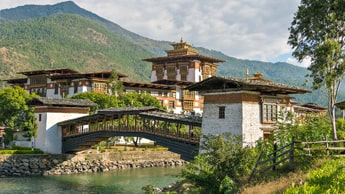
Punakha is a splendid town in Bhuatn's western region with lots of tourist attractions.
View Details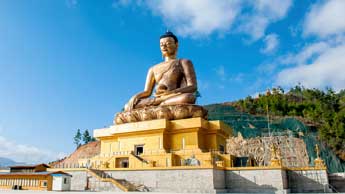
Thimphu is the capital town of Bhutan with countless tourist attractions you may explore.
View Details